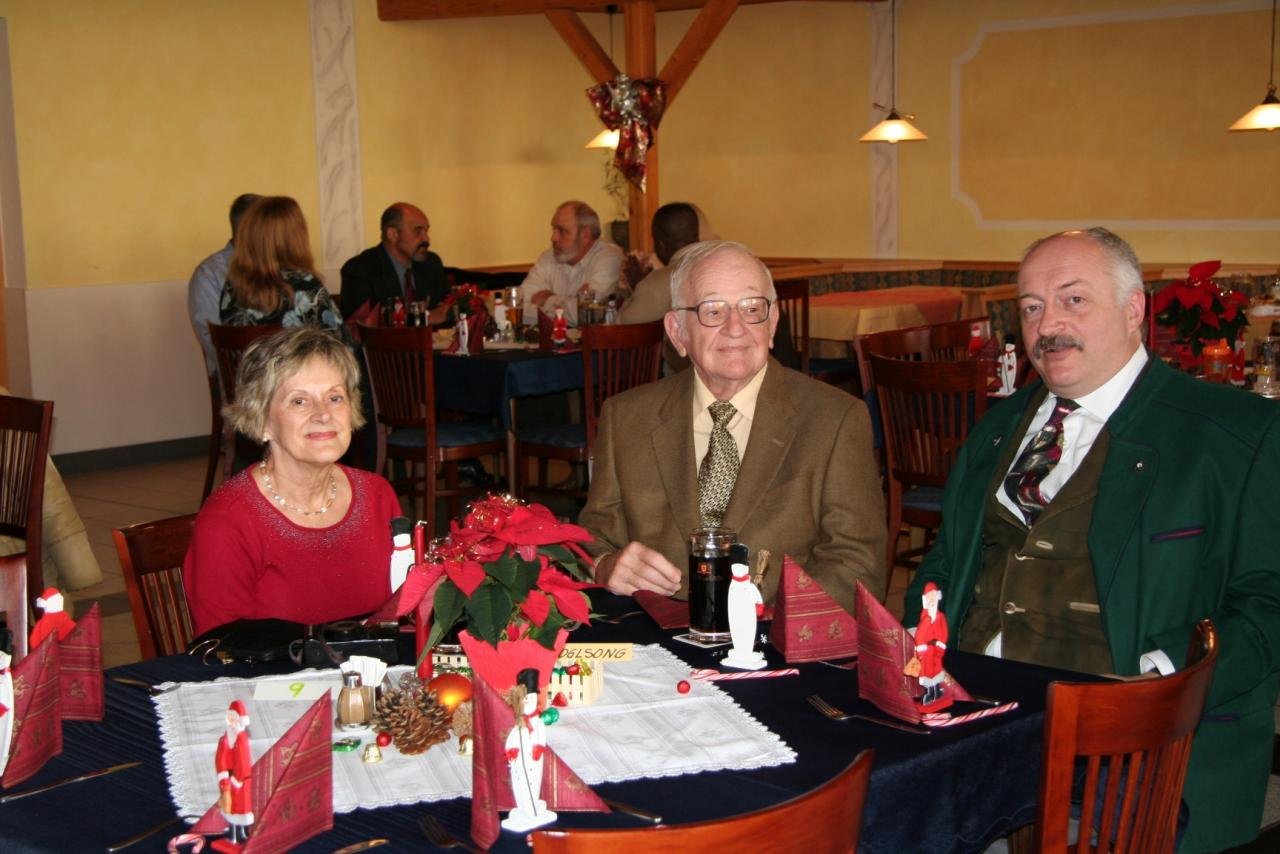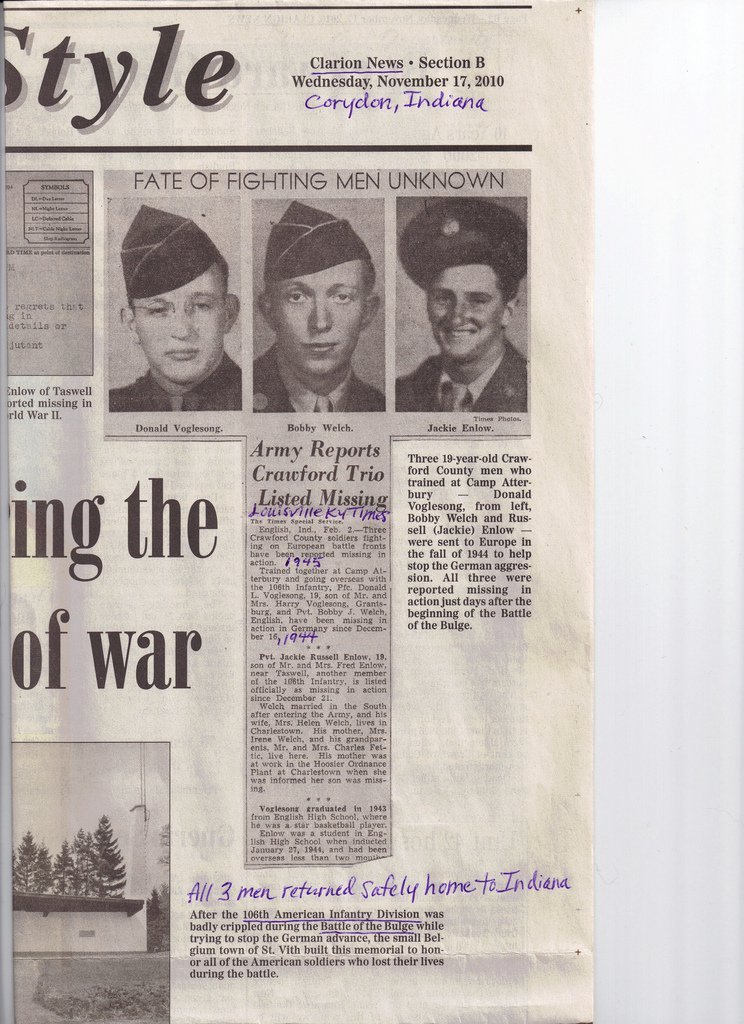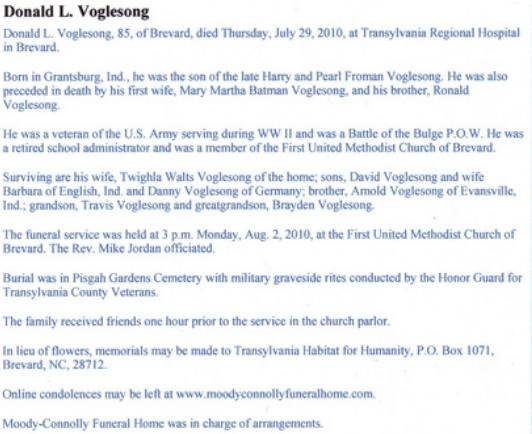Company F, 422nd Regiment
106th Infantry Division
Infantry Division - by Ms. Lorraine Miller, of "Translyvania Times", in Brevard, North Carolina, published February 14, 2007
With the ranks of the World War II veterans dwindling so rapidly, a letter received by the Transylvania Times with the information that a special veteran of this war was living in Transylvania was especially welcome. The letter was from Daniel Voglesong, the US Army Hohenfels Garrison Safety Manager in Bavaria; and was written about his father Donald Voglesong.
Donald Voglesong was in a German P.O.W. camp (prisoner of war) during the Battle of the Bulge in 1944-45 and now lives in Brevard, N.C. Donald Voglesong, now in his eighties and possessing a sharp mind for details, lives in the Deer Lake subdivision. His memories of his capture and internment give so much information about what those days were like for the prisoners of war. Voglesong was born in Grantsburg, a small farming community in the southern part of Indiana, not far from the Ohio River. "My mother, Grace Pearl Froman was 16 years old when she married my father. My dad, Harry W. Voglesong was a jack of all trades and could do almost any job that was available. I had two brothers, Ronald and Arnold and we all grew up on the farm, except for brief periods when we lived up north in the big city of Gary, Indiana. My father worked in the US Steel mills and later became a conductor on Gary's city street cars. But our whole family missed our home and farm in southern Indiana, so we moved back," Voglesong talked about his early days. Shortly after graduation from English High School, Donald Voglesong attended a special training school for sheet metal workers. "It
was one of Eleanor Roosevelt's ideas and It was a good one, but it didn't work out for me," Voglesong related. So, he volunteered for the US Army and had his basic infantry training at Fort Benning, GA. However, as a result of an ASTP test he had taken in high school, he was sent to Auburn College in Alabama (known as Polytech at that time.) Shortly thereafter his orders were changed once again and he was sent to Camp Atterbury, Indiana for infantry training in early 1944. "The general public does not appreciate how dangerous are the duties of the infantrymen in war," Voglesong commented as he discussed his 106th Infantry Division. Forty percent of that division was sent to Europe to fight in the Battle of the Bulge, and he was part of that percentage. The Allied Forces were suffering great losses at that time and were in desperate straits. Every available man was pressed into service to help save the situation, many with just a few short weeks of preparation.
Voglesong shipped out from New York City to Scotland and then on to London England by train. In one month's time he was part of the Battle of the Bulge in that small area of Europe where Belgium, Luxemburg and Germany meet. "It was a calculated risk, our placing only three divisions across this area when the battle started. The Germans employed rapidly moving Panzer tanks, known as lightning warfare, and it really worked for them as they quickly encircled the Allied Forces," Voglesong recalled. "We were surrounded and fighting a big battle for a long time until there were not many Americans
left; so our Regiment's commander surrendered and most of the 106th Division was captured. This was at Schoenberg, Belgium on December 19, 1944 when approximately 7,000 American soldiers were ambushed. "Meanwhile, General George S. Patton, Jr. was moving into the battle from the south. I never met him, to tell you the truth, but we were scared to death of him, he was so offensive minded. The Americans, as well as the Germans, respected him,"
Voglesong recalled. "I was 19 years old at the time, tired and worn out, and I can remember how the Nazis marched us all night for 30 miles during miserable winter conditions. They then put us in box cars on a German train. These primitive cars had no facilities and we were so crowded that there was no room to lie down. We traveled in those box cars for four days with nothing to eat, just a little water to drink," Voglesong sadly described that time in his life. "The war was winding down and the German economy was shattered. The Germans did not have much food themselves, so they gave us only pieces of bread and bowls of thin soup. We arrived at the P.O.W. camp (prisoner of war) at Bad Orb, a small village east of Frankfurt, Germany on Christmas Day and we were there until April of 1945," Voglesong described that difficult period of his life. There wasn't much for the prisoners to do. When they looked out of the barbed wire that enclosed the area, there was not much to see. They were so hungry that food became their main obsession. "So, we mainly sat around and talked and thought about food. To keep occupied, three or four of us started writing down all the things we
would have to eat when we were released," Voglesong described the rough conditions. "One thing that happened at that time which really scared me concerned one of the two or three letters home which I was allowed to write each month. A guard came into the building, called my name, and said, 'Come with me'" I was to present myself to the commander of the prison. I didn't know what to do when I was brought into his presence, so I saluted," Voglesong recalls. "I soon found out that a problem had arisen from one my letters home where I had complained about the lice. This had upset the
commander especially when he noted that I had a German family name. He wanted me to know that the lice had been brought in by soldiers from other countries, not by the Germans. He pointed out in, no uncertain terms, that the Germans were above that," Voglesong confided. Getting enough food to stay alive was the prisoners' primary goal. So, when a friend told Voglesong that they needed somebody to work at the dispensary, he volunteered because he knew it would mean receiving an extra piece of bread each week. His job was to clean up the floors with hot water, using a makeshift broom and patches of bags for mops. I usually shared that piece of bread with my buddies; but one time I ate it all myself because I was so hungry - all the time feeling guilty about it. I learned a lot about people and how they react under such austere conditions. A few were so selfish that they would do anything to stay alive, stealing your bread or your shoes at night,"
Voglesong described the details of those terrible days. "I always had the feeling that I would be the last one to get out of there. Many of the Americans died. In fact, four of them died in one day of pneumonia. We picked them up and carried them out. It was not a hard thing to do as they were very light, barely skins and bones," Voglesong remembered with sadness of life at the prison camp was absolutely nothing like the comedy TV show, "Hogan's Heroes", which portrayed conditions at a prisoner of war camp with humor. There were lots of atrocities committed on both sides. He remembers
that the SS Nazi troopers lined up 90 unarmed Americans in nearby Malmedy, Belgium and shot them dead. He mentioned that these fanatic Nazi S.S. German troops were fearsome fighters; but the normal German Army soldiers were not all that way. Many of them were just doing their jobs. In fact, he remembers feeling sad when he came upon one dead German soldier who was about 16 years old. At that time there were about four or five German soldiers lying dead in a little field and their comrades came along with wagons and took them away. "We were liberated from the prison camp by an American Reconnaissance Group. By that time the Germans had fled the area under the pressure of the advancing Americans. After our release, our US Army rescuers gave us cans of C-Rations to eat. However, we were so weak and malnourished that we were not able to finish the can of food all at one time. "The Americans interviewed each of us and then we were put on planes for France. When we got there we finally got a bath and clean clothes. Our new uniforms were much smaller than the ones we had originally been issued when we were inducted into the army. We had lost most our body weight," Voglesong said as he recalled his release from captivity. Voglesong was then sent to a London hospital for a couple weeks. Then came a joyous boat ride back to the United States, followed by a long furlough. One of his buddies at the prison camp, Jack Enlow of Taswell (also in Crawford County, Indiana) had developed TB (Tuberculosis), which eventually contributed to his death from lung disease.
After Voglesong was discharged and teaching school in Indiana he tested positive for TB on every annual physical exam. His paternal ancestor immigrant from Germany, the first Henry Voglesong, was a US Soldier in the Pennsylvania Infantry Regiment of the US Continental Army, during the American Revolution in 1780's. His great-grandfathers had also fought for the US Army, as they were in Indiana regiments during the US Civil War
1861-1865. My paternal great-grandfather, also named Henry Voglesong had served under US Union General William Sherman, marching from Atlanta to the sea and then north up the coast," Voglesong added. "After my return from the service, I taught school. My wife of 42 years, Mary Martha Batman Voglesong had died and I was retired as principal of a high school, teaching business and history, as well. I later became re-acquainted with my present wife, Twighla Walts Voglesong, who was then an elementary school teacher in nearby Paoli, Indiana. We had known each other since we were children, as we lived in a small farming hamlet of Grantsburg in Crawford County (Indiana) where everyone knew each other. I encountered her at a Grantsburg Cemetery board meeting on a Saturday, asked her out the following day to go to the park and by that Sunday I had proposed and she had answered "yes:. That was in
November 1991 and we were married in December, one month later. "When it came time to retire, Twighla was looking for a better place to live, although there was nothing wrong with Indiana. Through a trade magazine we found an ad for Deer Lake in Brevard; so we mailed in a request for information. We got an answer inviting us to come down and take a look for ourselves. So we drove to Deer Lake, fell in love with the area, bought a place, and moved in five years ago," Voglesong talked about coming to North
Carolina. Don and Twighla are happy at Deer Lake since there are so many friendly people there. In fact, they have made several trips with a group of their neighbors and have enjoyed traveling. Twighla is a very active member of the Brevard community. She volunteers at Habitat, SAFE's Attic and the library. She is the secretary of the Friends of the Library and is also very involved with her Methodist church activities. His son Daniel, who wrote the letter to the Transylvania Times, lives in the village of Breitenbrunn while he is working for the US Army at one of the last training camps at JMRC Hohenfels, that the Americans have in Germany. He is stationed in Bavaria and very happy there. "My son invited us t visit him in March of last year, 2006. He lives in the mountains in a beautiful part of the country. The state-owned forests are carefully managed there: when a tree is cut down, it must be replaced. "Although my son is a Presbyterian, he was invited to sing in the choir of a beautiful 600-year old Breitenbrunn Catholic Church".
Every town in that area of Bavaria has a musical band and they go from house to house serenading the people. They are then served cups of a hot drink which is very strong. In fact, it takes your head off," Voglesong laughs as he describes the libation. In his letter about his dad, his son said that the first thing his father wanted to do when he arrived at the Frankfurt Airport, at Donald Voglesong's first visit to Germany in June 1999 was to visit the camp where he had been held prisoner in the nearby village of Bad
Orb. They had a hard time locating it, because it is now a children's summer camp, but finally found it. There they met a German grade school teacher from Frankfurt with his schoolchildren. After Don's son told the German teacher that his father had been a prisoner at that place, the man told the children (in German) that his father had done a heroic thing to help save Germany from the Nazi dictatorship. The children all clapped to applaud Donald and it was a very emotional moment for Mr Voglesong. Voglesong says that politically he is a strong Democrat and that it is the subject of much discussion with his buddies at the Deer Lake Clubhouse. He feels very strongly against wars. He says that he was fighting with the U.S. military for such a short time that he did not have much experience in that regard; but that 80% of the Americans killed in World War II were infantry soldiers.
"They just gave us an M-1 rifle and hand grenades and sent us off to the fight. That war was fought mainly by Americans who were poor. It was a rich man's war and a poor man's fight." Voglesong concluded.
Published on February 14, 2007
-------
Donald and Twighla Voglesong of Brevard, NC, visited Donald's son Dan Voglesong, US Army Garrison Hohenfels-Safety Manager for Christmas Holiday Seasons December 2006 and December 2007 in Beitenbrunn, Bavaria.
Donald Voglesong, was a 19 year old US Army Corporal of the 106th Infantry Division in combat, on the US forces front line, when he was captured (along with 7,000 other American soldiers, including many other Hoosiers like Kurt Vonnegut - the famous US author, also of German-ancestry from Indiana ) December 1944, at Schoenberg, Belgium, during the Battle of the Bulge of WWII. CPL Voglesong, along with two of his hometown friends from English, Indiana, were then transported by train ( of the German Army ) to a P.O.W. camp at Bad Orb ( a small village just East of Frankfurt ). He spent the remaining 4 and a half months of World War II at Bad Orb P.O.W. camp, until the surrender of the Nazi Dictator Government. He lost much of his body weight, at the P.O.W. camp and recovered in a London,UK Hospital after his release.
During his 2nd visit to Germany in June of 1999, Mr. Voglesong had a much more pleasant experience. Upon arrival at the Frankfurt Airport, he asked his son Dan Voglesong to drive him to the Bad Orb, P.O.W. prison camp site.
Upon arrival at this Bad Orb camp ( which is now a children's summer camp ), Donald Voglesong, and his wife Twighla had met a German elementary school teacher, who was visiting this summer camp with his schoolchildren from Frankfurt. Dan Voglesong explained to the German school teacher about his father's internment there, in the P.O.W. camp, as an American P.O.W. in Bad Orb, from Dec 1944 to April 1945. The German school teacher then informed the school children ( in German ) that Mr. Voglesong was a hero for helping to liberate Germany from the Nazis in WWII, and that these schoolchildren, should give him a round of applause, which they did.
On 27-28 December 2006 Mr. Donald Voglesong visited Schoenberg, and St Vith, Belgium (where he was a US Infantry Soldier in WWII ). He also visited the Malmedy Massacre site and Bastogne, Belgium WWII Memorial and the Luxembourg City US Military Cemetery with GEN Patton's Gravesite and adjacent German Military Cemetery.
Mr. Donald Voglesong is a retired High School Principal, Assistant Principal, and History and Business Teacher, from southern Indiana. He and his wife Twighla ( a retired Elementary School Teacher ) live in Brevard, North Carolina.

about my father Donald Voglesong, Bad Orb POW Soldier of 106th Inf Div, 422nd Regt, Co F, and his two friends (all from Crawford County, Indiana) who were captured at Schoenberg, Belgium, and all 3 friends were interned together as POWs at Stalag 9-B in Bad Orb. All 3 men: Bobby Welch, Jackie Enlow and my father Donald Voglesong survived the war under malnutrition and exposure to tuberculosis and typhus from body lice. Jackie Enlow died in his middle-age, from emphysema caused by his tuberculosis. Bobby Welch died a few months earlier than my father in last year 2010. After the 3 POW friends died last year, the "CLARION NEWS" of Corydon, Indiana published 2 extensive articles about the wartime experiences of the 3 friends - part 1 was published on 17 November and part 2 published on 24 November 2010.
Here is the obituary of my father Donald Voglesong, when he died on 29 July 2010 and my last photo of him
http://moodyconnollyfh.frontrunnerpro.com/runtime/75209/runtime.php?SiteId=75209&NavigatorId=281984&op=tributeObituary&viewOpt=dpaneOnly&ItemId=503245


Best regards, Daniel Voglesong, Breitenbrunn, Oberpfalz, Bavaria
© James D. West www.IndianaMilitary.org